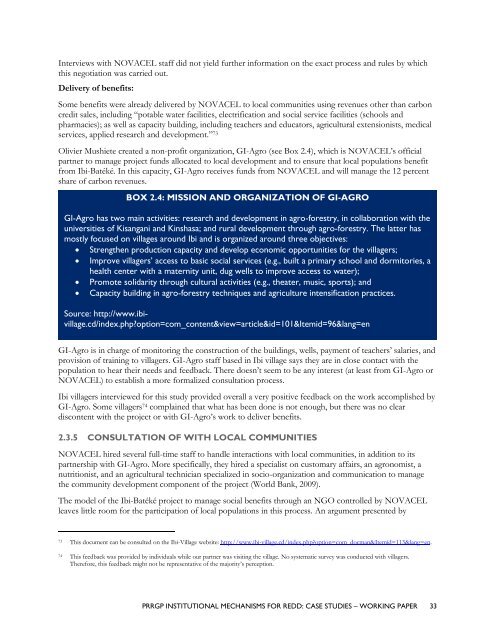Institutional Mechanisms for REDD+ - Case Studies Working Paper
Institutional Mechanisms for REDD+ - Case Studies Working Paper
Institutional Mechanisms for REDD+ - Case Studies Working Paper
You also want an ePaper? Increase the reach of your titles
YUMPU automatically turns print PDFs into web optimized ePapers that Google loves.
Interviews with NOVACEL staff did not yield further in<strong>for</strong>mation on the exact process and rules by which<br />
this negotiation was carried out.<br />
Delivery of benefits:<br />
Some benefits were already delivered by NOVACEL to local communities using revenues other than carbon<br />
credit sales, including ―potable water facilities, electrification and social service facilities (schools and<br />
pharmacies); as well as capacity building, including teachers and educators, agricultural extensionists, medical<br />
services, applied research and development.‖ 73<br />
Olivier Mushiete created a non-profit organization, GI-Agro (see Box 2.4), which is NOVACEL‘s official<br />
partner to manage project funds allocated to local development and to ensure that local populations benefit<br />
from Ibi-Batéké. In this capacity, GI-Agro receives funds from NOVACEL and will manage the 12 percent<br />
share of carbon revenues.<br />
BOX 2.4: MISSION AND ORGANIZATION OF GI-AGRO<br />
GI-Agro has two main activities: research and development in agro-<strong>for</strong>estry, in collaboration with the<br />
universities of Kisangani and Kinshasa; and rural development through agro-<strong>for</strong>estry. The latter has<br />
mostly focused on villages around Ibi and is organized around three objectives:<br />
� Strengthen production capacity and develop economic opportunities <strong>for</strong> the villagers;<br />
� Improve villagers’ access to basic social services (e.g., built a primary school and dormitories, a<br />
health center with a maternity unit, dug wells to improve access to water);<br />
� Promote solidarity through cultural activities (e.g., theater, music, sports); and<br />
� Capacity building in agro-<strong>for</strong>estry techniques and agriculture intensification practices.<br />
Source: http://www.ibivillage.cd/index.php?option=com_content&view=article&id=101&Itemid=96&lang=en<br />
GI-Agro is in charge of monitoring the construction of the buildings, wells, payment of teachers‘ salaries, and<br />
provision of training to villagers. GI-Agro staff based in Ibi village says they are in close contact with the<br />
population to hear their needs and feedback. There doesn‘t seem to be any interest (at least from GI-Agro or<br />
NOVACEL) to establish a more <strong>for</strong>malized consultation process.<br />
Ibi villagers interviewed <strong>for</strong> this study provided overall a very positive feedback on the work accomplished by<br />
GI-Agro. Some villagers 74 complained that what has been done is not enough, but there was no clear<br />
discontent with the project or with GI-Agro‘s work to deliver benefits.<br />
2.3.5 CONSULTATION OF WITH LOCAL COMMUNITIES<br />
NOVACEL hired several full-time staff to handle interactions with local communities, in addition to its<br />
partnership with GI-Agro. More specifically, they hired a specialist on customary affairs, an agronomist, a<br />
nutritionist, and an agricultural technician specialized in socio-organization and communication to manage<br />
the community development component of the project (World Bank, 2009).<br />
The model of the Ibi-Batéké project to manage social benefits through an NGO controlled by NOVACEL<br />
leaves little room <strong>for</strong> the participation of local populations in this process. An argument presented by<br />
73 This document can be consulted on the Ibi-Village website: http://www.ibi-village.cd/index.php?option=com_docman&Itemid=113&lang=en.<br />
74 This feedback was provided by individuals while our partner was visiting the village. No systematic survey was conducted with villagers.<br />
There<strong>for</strong>e, this feedback might not be representative of the majority‘s perception.<br />
PRRGP INSTITUTIONAL MECHANISMS FOR REDD: CASE STUDIES – WORKING PAPER 33

















